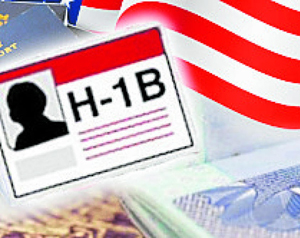H-1B spouses get breather, US curbs on hold
www.mangaloretoday.com
Washington, March 4, 2018 (PTI): The Trump administration has delayed its decision on termination of work authorisation for spouses of the H-1B visa holders, in a big relief to a significantly large number of Indian workers and their families. The Department of Homeland Security (DHS) in a court submission this week said that it would not take a decision on terminating the work authorisation of H4 visa users, spouses of H-1B visa holders, till June as it needs time to review the economic impact of such a decision.
The Department of Homeland Security (DHS) in a court submission this week said that it would not take a decision on terminating the work authorisation of H4 visa users, spouses of H-1B visa holders, till June as it needs time to review the economic impact of such a decision.
Since 2015, the spouses of H-1B, or high-skilled, visa holders waiting for green cards have been eligible to work in the US on H-4 dependent visas, under a rule introduced by the previous Obama administration.
The DHS was previously scheduled to take a call on it by February 28. “Consistent with the Government’s prior representations, DHS was working to issue an NPRM (Notice of Proposed Rule Making) in February 2018. However, in January 2018, United States Citizenship and Immigration Services (USCIS), the component of DHS responsible for oversight of the H-4 visa programme at issue in this litigation, reevaluated the rule and determined that significant revisions to the draft proposal were necessary,” DHS said in its fresh court submission.
It said the revisions required a new economic analysis which required an additional several weeks to perform.
“The changes to the rule and the revised economic analysis require revisions to the projected time-line for the NPRMs publication, and therefore cannot be issued in February,” it said. “Under the revised time-line, DHS anticipates submitting to the Office of Management and Budget for review and clearance the proposed rule in time for publication in June 2018,” it said.
The extension of decision-making process by four months comes as a temporary relief to the spouses of H-1B visas holders, a significantly large number of whom are Indian workers. The H-1B programme attracts foreign specialised workers to come to the United States for employment, many of them from India and China.
- JEE (Main) second edition results to be announced by April 19: NTA
- Three arrested for raping woman in Mangaluru, say police
- Summer rush: Special trains, Vande Bharat sleeper announced for Mangaluru
- Mangaluru: Yellow alert issued as thunderstorms expected across coastal Karnataka
- Mangaluru: Bride-to-be goes missing a day before wedding in Bolar
- Puttur: Grand Brahmarathotsav at Shri Mahalingeshwara Temple draws thousands with devotion and splendor
- Karnataka HC raps state over protest against Waqf Act amid pending SC case
- Fisheries Ministry to launch data collection across the country for Marine Fishers Census from November
- Elephant tries to sneak into house in Mudigere
- Holy Thursday celebrated with solemnity at Our Lady of Miracles Church, Milagres
- ABVP to launch ‘Save Mangalore University’ campaign
- MLA asks corporation to focus on landslip-prone areas and under-construction buildings ahead of Monsoon
- Mangaluru: Woman gang-raped near Netravati river, auto driver among three arrested
- CET row: Karnataka govt orders probe after students asked to remove sacred thread
- Man who flashed woman, assaulted 7 people arrested in Bengaluru
- FIR against Sunny Deol, Randeep Hooda for offending Christian religious sentiments in Jaat
- 22 maoists surrender before security forces in Chhattisgarh’s Sukma
- Indian Embassy repatriates 4 nationals scammed in Myanmar’s Myawaddy
- ED debunks Bengaluru man’s claims of importing Rs 50-crore wolfdog
- Special cabinet meeting on caste census in Karnataka ends without any major decision
- High Court to hear Ranya Rao bail plea on April 21
- India slams Pakistan Army chief’s remarks: ‘Kashmir’s only relation with Pak is…’
- Removal of sacred thread at CET centre in Shivamogga triggers row
- JD Vance, wife Usha to visit India from April 21-24, hold talks with PM Modi
- 22 Naxalites arrested, explosives seized in Chhattisgarh
- Skills and Competencies Take Center Stage at MSN Dialogue Series
- Court remands Maoist Lakshmi to six-day police custody
- Sandhya Shenoy honored with Society for Materials Chemistry Medal-2024
- White Cornus Apartment in Mangaluru
- City girl wins first place in state-level spell bee competition
- Alleged ‘Love Jihad’ Case in Mangaluru: Woman left home voluntarily, says police
- Girl fatally struck by reckless two-wheeler near Belman
- New residential complex for the judges inaugurated in Mangaluru
- Absconding accused nabbed after 8 years
- Truck with cylinders turns turtle in Beltangady
- Bhoota Kola artist dies of cardiac arrest
- Development of the country should be our goal: Ganesh Karnik
- Container truck gets stuck under Modankap railway bridge
- Truck crushes bike’s pillion rider near BC Road
- Head constable dies of heart attack
- CITY INFORMATION
- TRAVEL
- TOURIST INFORMATION
- HEALTH CARE
- MISCELLANEOUS




 Write Comment
Write Comment E-Mail To a Friend
E-Mail To a Friend Facebook
Facebook Twitter
Twitter  Print
Print 


